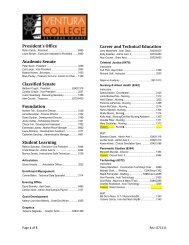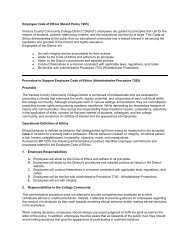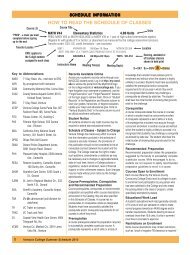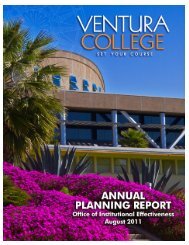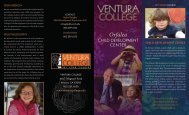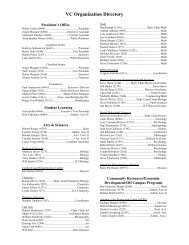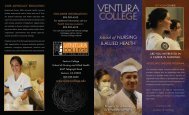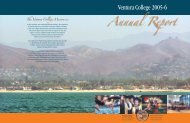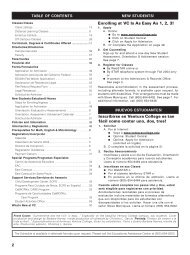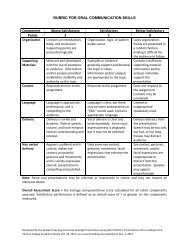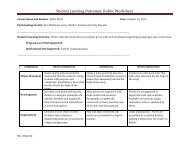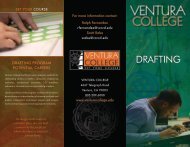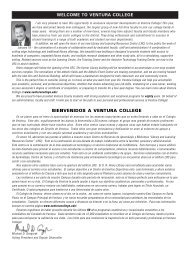2011 General CataloG & announCement of Courses - Ventura College
2011 General CataloG & announCement of Courses - Ventura College
2011 General CataloG & announCement of Courses - Ventura College
You also want an ePaper? Increase the reach of your titles
YUMPU automatically turns print PDFs into web optimized ePapers that Google loves.
BIOL V01L - PRINCIPLES OF BIOLOGY LABORATORY - 1 Unit<br />
Prerequisite: BIOL V01 or concurrent enrollment<br />
Hours: 3 laboratory weekly<br />
The course provides a hands-on introduction to the basic<br />
principles <strong>of</strong> biology and covers the biochemistry, physiology,<br />
morphology, behavior, genetics, evolution, taxonomy, and ecology <strong>of</strong><br />
living things.<br />
Field trips may be required. Transfer credit: CSU; UC; credit<br />
limitations - see counselor.<br />
BIOL V03 - INTRODUCTION TO ORGANISMAL AND<br />
ENVIRONMENTAL BIOLOGY - 5 Units<br />
Prerequisite: CHEM V01A-V01AL or CHEM V20-V20L or 1 year <strong>of</strong><br />
high school chemistry with grades <strong>of</strong> C or better; and MATH V03<br />
or MATH V03A-V03E or 1 year <strong>of</strong> high school intermediate algebra<br />
(Algebra II) with grade <strong>of</strong> C or better<br />
Recommended preparation: ANPH V01 or BIOL V01-V01L or BIOL<br />
V29-V29L or MICR V01 or 1 year <strong>of</strong> high school biology with grades<br />
<strong>of</strong> C or better; CHEM V01B-V01BL; MATH V21A or V46A; and MATH<br />
V44<br />
Hours: 3 lecture, 6 laboratory weekly<br />
This course is an introduction to organismal diversity, structure<br />
and function. Groups to be studied and discussed include: bacteria,<br />
archaea, protists, fungi, plants and animals. The latter two groups<br />
will be studied in more detail, concentrating on structure and<br />
physiology. The overall emphasis <strong>of</strong> the course will be on the<br />
evolutionary and ecological relationships between organisms. The<br />
laboratory will develop skills <strong>of</strong> analysis and observation as they<br />
relate to the preceding topics.<br />
Field trips will be required. Formerly BIOL V20B. Transfer credit:<br />
CSU; UC.<br />
BIOL V04 - INTRODUCTION TO CELL AND MOLECULAR<br />
BIOLOGY - 5 Units<br />
Prerequisite: CHEM V01A-V01AL with grades <strong>of</strong> C or better<br />
Recommended preparation: BIOL V03; CHEM V01B-V01BL; MATH<br />
V21A or V46A; and MATH V44<br />
Hours: 3 lecture, 6 laboratory weekly<br />
This course will cover principles and applications <strong>of</strong> the structure<br />
and function <strong>of</strong> biological molecules, prokaryotic and eukaryotic<br />
cell structure and function, homeostasis, cell reproduction and<br />
its controls, molecular biology, molecular genetics, transmission<br />
genetics, cell metabolism including photosynthesis, respiration<br />
and viruses. The philosophy <strong>of</strong> science, scientific methods and<br />
experimental design are foundational to the course. The laboratory<br />
will develop skills <strong>of</strong> analysis and observation as they relate to the<br />
preceding topics.<br />
Field trips may be required. Formerly BIOL V20A. Transfer credit:<br />
CSU; UC.<br />
BIOL V10 - INTRODUCTION TO ENVIRONMENTAL<br />
ISSUES - 3 Units<br />
Hours: 3 lecture weekly<br />
This course is an examination and analysis <strong>of</strong> the biological<br />
sciences within the context <strong>of</strong> the interrelationship between human<br />
populations and their natural surroundings. The characteristics <strong>of</strong><br />
natural systems are described and the effects and impacts <strong>of</strong> human<br />
activities on these systems are considered. The course introduces<br />
the principles <strong>of</strong> scientific inquiry and experimental methodology<br />
in the study <strong>of</strong> ecological concepts and environmental issues.<br />
Alternatives and approaches to deal with environmental problems are<br />
considered and evaluated.<br />
Field trips may be required. Formerly Biol 10. Same as ESRM V01.<br />
Transfer credit: CSU; UC; credit limitations - see counselor.<br />
BIOL V12 - PRINCIPLES OF HUMAN BIOLOGY - 3 Units<br />
Recommended preparation: high school biology and high school<br />
chemistry<br />
Hours: 3 lecture weekly<br />
This is an introductory course in the principles <strong>of</strong> biology, with<br />
special emphasis on the structure and function <strong>of</strong> the human being.<br />
It provides a study <strong>of</strong> body systems and their relationship to health<br />
or disease, as well as a discussion <strong>of</strong> the roles and effects <strong>of</strong> human<br />
beings in the biological world.<br />
Field trips may be required. Formerly Biol 12. Transfer credit: CSU;<br />
UC; credit limitations - see counselor.<br />
BIOL V14 - FIELD BIOLOGY - 4 Units<br />
Hours: 3 lecture, 3 laboratory weekly<br />
This course is designed to introduce students to the study <strong>of</strong><br />
biology in a field setting. Emphasis will be placed on the adaptation<br />
<strong>of</strong> organisms to their particular environment. Topics will include<br />
evolution, niche, population dynamics, community, ecosystems,<br />
energy flow, and terrestrial biomes. Field trips will stress<br />
identification and classification <strong>of</strong> common plants and animals.<br />
Field trips will be required. Formerly Biol 14. Transfer credit: CSU.<br />
BIOL V18 - HUMAN HEREDITY - 3 Units<br />
Recommended preparation: BIOL V01-V01L or BIOL V04<br />
Hours: 3 lecture weekly<br />
This course is an introduction to the basic principles <strong>of</strong> modern<br />
genetics and evolutionary theory with specific reference to the human<br />
being. Through the study <strong>of</strong> the mechanisms <strong>of</strong> human inheritance,<br />
the origin and nature <strong>of</strong> human differences will be examined. Social,<br />
political and psychological ramifications <strong>of</strong> the biological laws<br />
governing heredity and organic evolution will be emphasized.<br />
Field trips may be required. Formerly Biol 18. Transfer credit: CSU;<br />
UC.<br />
BIOL V23 - PLANT BIOLOGY - 4 Units<br />
Hours: 3 lecture, 3 laboratory weekly<br />
This course is a study <strong>of</strong> the practical aspects <strong>of</strong> plant growth,<br />
environmental relationships, physiology, structures, function,<br />
reproduction, and evolution. Basic concepts <strong>of</strong> biology will be<br />
illustrated utilizing the identification and study <strong>of</strong> important economic<br />
crops. Independent study projects and field laboratories are required.<br />
Field trips will be required. Same as AG V03. Transfer credit: CSU;<br />
UC; credit limitations - see counselor.<br />
BIOL V29 - MARINE BIOLOGY - 3 Units<br />
Hours: 3 lecture weekly<br />
This course is an introduction to marine biology, with emphasis<br />
on the physiology, morphology, taxonomy, ecology, evolution, and<br />
natural history <strong>of</strong> marine organisms. The conservation <strong>of</strong> the marine<br />
environment will also be covered.<br />
Field trips may be required. Formerly Biol 29. Transfer credit: CSU;<br />
UC.<br />
BIOL V29L - MARINE BIOLOGY LABORATORY - 1 Unit<br />
Prerequisite: BIOL V29 or concurrent enrollment<br />
Hours: 3 laboratory weekly<br />
This course is a laboratory and field study <strong>of</strong> marine organisms<br />
and environments. Students will examine biological principles<br />
utilizing the scientific method.<br />
Field trips will be required. Formerly Biol 29L. Transfer credit: CSU; UC.<br />
96 Credit <strong>Courses</strong>, Degrees, Certificates, and Awards <strong>Ventura</strong> <strong>College</strong> Catalog 2010 - <strong>2011</strong>



